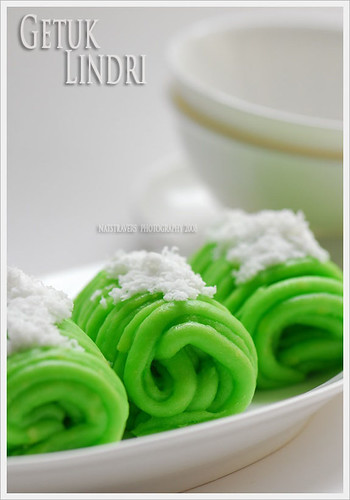
1. SODA GEMBIRA
Soda Gembira (source: noteempire.com)
2. KLAPERTAART

The West gave Indonesia sponge cake, rum and custard, and we gave them Klapertaart. This North Sulawesi dessert embodies fusion at its very best. First, enjoy a whiff of its heady, aromatic smell, before tucking into the delectable sponge cake soaked with strong rum and runny custard, then topped with juicy young coconut flesh, meringue, chopped canary nuts, raisins and a sprinkling of cinnamon. Usually eaten straight from the fridge, this more-ish, melt-in-your- mouth dessert is a cooling, sweet treat after a typically spicy Manado meal.
3. CENDOL

These green jelly-like strands made from mung-bean flour taste quite plain on their own. But mixed with lashings of palm sugar syrup, fresh coconut milk and heaped ice cubes, it springs to life. In traditional Central Javanese wedding receptions, guests will barter broken tiles for glasses of cendol, “sold” by the parents of the bride. The guests flocking for their fix, and the generous amounts of cendol in everyone’s glass, signify bountiful fortune for the newlyweds. Even more reason for you to order a second helping.
4. GETUK

Eaten with lightly salted, freshly grated coconut, Getuk started life as a humble rice-substitute in more desolate times, and today it remains a popular Javanese snack. The plump, chewy, colorful cake (ranging from caramel brown to bubblegum pink) is usually made from cassava, though nowadays people experiment with yams, potatoes and taro. Variations include getuk lindri (the most popular), getuk ciwel (less common, black in color), fried getuk from Sokaraja and banana getuk originally from Kediri.
5. KUE PUTU

Putu vendors only come out after sundown, and you know they’re in your neighborhood because of the characteristic whistles and long toots from the bamboo molds used in steaming the putu cakes. The vendor stuffs the mold halfway with moist rice flour, shaved palm sugar, then more rice flour before steaming the bamboo. In mere minutes they are pushed out of their molds and sprinkled with freshly grated coconut. Voila, a soft yet firm cake with a pleasing burst of hot, melted sugar in the middle.
6. SERABI

Watching this Indonesian pancake being made is truly satisfying.The batter of rice flour and coconut milk is ladled onto hot-fired claypots, which are covered until the cakes are ready, then served with palm sugar syrup and coconut milk. Some variations of the cake are eaten without sauce. Serabi Solo has crispy tanned edges, with toppings in its center like cheese, chocolate or jackfruit. And Serabi Jakarta (or “breast cake”) has no topping and even wider edges, with a center that puffs up into a pillowy delight.
7. BUBUR KETAN ITEM

When it’s cold outside, a bowl of warm black glutinous rice porridge hits the spot for many Indonesians. Its simple presentation belies the effort behind this rich comfort food. The black glutinous rice has to be soaked overnight and needs to be constantly stirred when cooked. But it is well worth the wait. There are few things in life better than curling up on a rainy day and devouring this creamy, sticky and slightly gritty black glutinous rice porridge – drenched in thin, aromatic coconut milk.
8. BIR PLETOK

Looking for something sweet and spicy? Although the name says beer, bir pletok doesn’t contain alcohol, is drunk warm, and is actually good for your health. This native Jakarta drink is made from 12 spices boiled together with sugar and water, and is not fermented, despite undergoing two distillations. The sound of cracking cardamom during boiling lends the ‘pletok’ part of the name. But why beer? One account says that Pitung, a local Robin Hood-style hero, likened the drink to the Dutch favorite tipple.
9. COLENAK

The Sundanese love to name snacks with acronyms. In this case, colenak is short for “dicocol enak” (good when dipped), a name suggested by blue-blooded customers when the snack was first introduced in Bandung during the early 1930s. Popular with people of all ages and different rungs of society, this concoction of grilled fermented cassava (peuyeum), dipped in a sauce of grated coconut and melted palm sugar, was served to visiting foreign dignitaries during the Asian African Conference in 1955.
10. DODOL

Anthony Bourdain doesn’t care for it, but 200 million Indonesians can’t be wrong. Made from glutinous rice flour, sugar and coconut milk, then cooked for three hours until caramelized, dodol is sticky, chewy and comes in many flavors – chocolate, sesame and all manner of fruit. The most popular flavor is durian, and the best place to buy it is in Garut, West Java. In Bali, the taffy-like sweets are wrapped in dried corn leaf and used in ritual offerings on the holy days of Galungan and Kuningan.
No comments:
Post a Comment